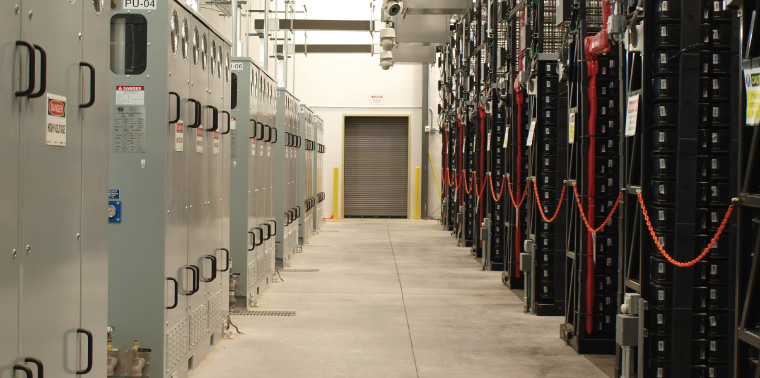And at $250 per kWh, consulting firm McKinsey & Co. predicts automakers will be able to build electric vehicles that would be competitively priced in comparison to conventional cars, but with much lower fuel costs. With an eye on a future where there’s a Chevy Volt, Nissan Leaf or the like in every garage, utilities and carmakers are beginning to test vehicle-to-grid systems where EVs’ big battery packs are enlisted to back up the grid.
Powering Ahead
Innovative startups and companies from outside the utility sector are leading the shift towards smart storage. It’s not that utilities won’t play a big role here, but historically they tend to follow, says GreenTech Media smart grid analyst Zach Pollock. “Utilities’ adoption of nascent technologies is typically constrained by cautious regulators, conservative cultures and long budget cycles.”
And maybe that’s okay. Smart storage offers a rare opportunity, says Rittershausen. “We can do a project that makes a profit, saves the consumer money and reduces inefficiency,” he adds. “If this is done right it makes sense for investors, end users and utilities too.”
UPDATED 03.02.13: This article has been updated to remove reference to the cost of energy storage declining to $300 to $600 per kWh by 2020.
Ensia shares solutions-focused stories free of charge through our online magazine and partner media. That means audiences around the world have ready access to stories that can — and do — help them shape a better future. If you value our work, please show your support today.
Yes, I'll support Ensia!

It purely talks about $ per kWh. However the reference used to back up "could be on track to decline by another 50 percent by 2020, to $300 to $600 per kWh" is in fact to a site that talks about storage dropping to $300 to $600 per kW, not kWh.
The website linked to also gives the costs in Australian, not US dollars.
Before making optimistic prognostications about costs reductions in battery storage it may be best to check that the numbers stack up first.
Robert Wilson
http://carboncounter.wordpress.com/
"California isn’t facing an imminent energy crisis, nor would renewables be to blame if such a thing occurred. What California is really facing is the need to add flexible capacity to its energy supply mix."
You say, "as a rule of thumb, grid experts believe that when intermittent power sources such as wind and solar surpass 20 percent, grid instability soars." However, DOE studies such as the Western Wind and Solar Integration Study have found that this is not the case. Even for renewable penetrations in excess of 30%, they did not find a need for storage. It was not even cost-justified to build more pumped hydro.
There will certainly be localized situations where storage will first be cost effective, such as the peak shaving opportunities that you discuss in the article or to help put more distributed solar energy on weak distribution feeders, but I don't see evidence that large-scale storage will play a major role (or be required) for higher penetrations of renewables in the general case.
I agree with the comment that you posted above about California - they need flexibility in their system. But it is interesting to note that well functioning power markets like ERCOT in Texas and MISO in the Midwest, where they dispatch wind energy and almost all conventional generators participate in the market, do not have the same concern as California. For complex reasons, most conventional generators in California do not allow the market system to dispatch their units, so even the flexibility that exists is often not available to the system operator. Hopefully they will find ways to fix that as well as add more flexible capacity.
While IA and SD are small demand pools, these records reinforce the point that grid operators, especially in the wind-rich Midwest and Texas (n.b.: Texas has more installed wind capacity than the U.K.), are fast learning to better manage big volumes of variable renewables. As this post at World Resources Institute explains, more states are headed towards this threshold, too: wind topped 10 percent for the full year in seven other states (North Dakota, Minnesota, Kansas, Colorado, Idaho, Oklahoma, Oregon).
You raise a good point about the deep role of regulations here. They are vexingly complex within each market, and vary from region to region. I’ve heard industry players repeatedly point out that many of the technical regulatory rules governing the grid were set out decades ago, meant to ensure stability at all costs, but today have the unintended effect of locking out newer technologies.
In a negative example, grid rules here in the NY region — and many others, I understand — meant that owners of solar-powered houses were surprised to discover they couldn’t tap their own panels when the wider grid went down after Superstorm Sandy. But change is afoot, if slowly. In a good example, federal grid rules were recently revised to reward providers of a type of very short term grid storage (known as frequency regulation) in such a way that advanced flywheels are winning-out over incumbent fossil fuel plants.
The addition of storage is a facet of the larger, long-term rehab of our aging grid. And however quickly storage scales up, we need to continue to upgrade the hardware and software that manages the grid. A smarter grid opens the door to much larger flows of renewables, while also lowering the risk of blackouts.